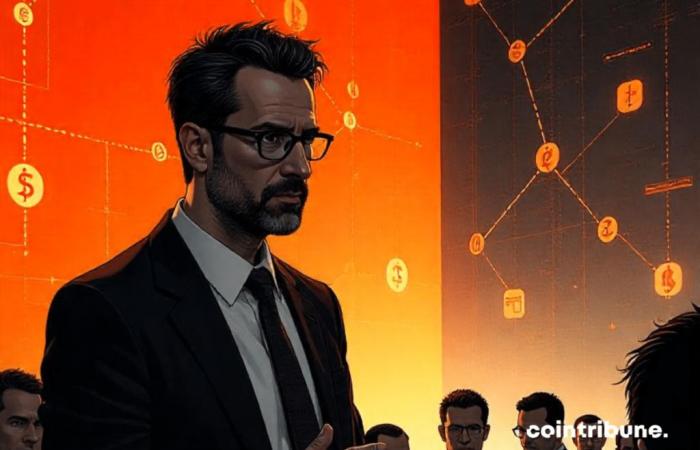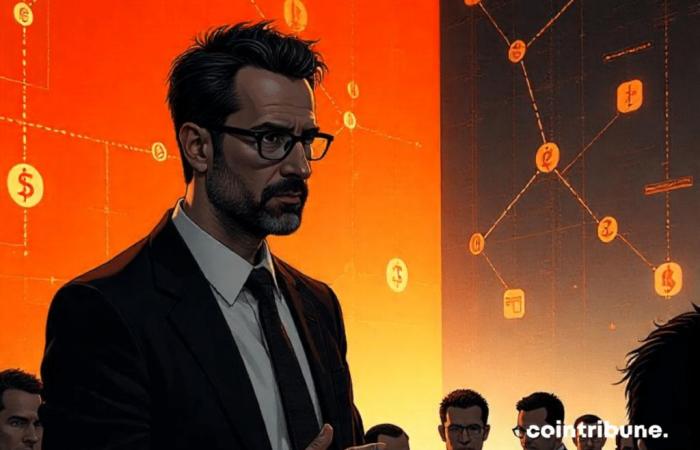10 a.m. ▪
5
min reading ▪ by
Luc Jose A.
During a speech at the Redacted conference organized by Near, Edward Snowden, iconic figure in the protection of individual freedoms, targeted Solana, one of the heavyweights in the sector. Indeed, he called it a project hampered by the weight of venture capitalists. For Snowden, the influence of large investors endangers the basic principles of blockchain, and gives financial giants too strong a hold on networks that want to be autonomous. But beyond Solana, Snowden’s remarks go to the heart of contemporary blockchain issues. In the age of AI and mass surveillance, could decentralization be the last bastion of digital freedom?
A “blockchain born in prison”? The weight of venture capitalists in Solana
During the Token2049 conference from September 18 to 19, Edward Snowden sparked a heated debate because he described Solana as a “centralized chain”. According to him, Solana would have chosen to sacrifice decentralization in favor of performance and efficiency, with centralized governance facilitated by venture capital investors. The emblematic figure of the defense of privacy returns to the charge again during the Redacted Bangkok conference from November 9 to 11, 2024.
During this event, Snowden further stated that Solana is a “born in prison” blockchain. According to him, this chain, although promising and technologically advanced, was marked from the start by too much dependence on venture capital investors. “They sold their soul to venture capital, and that limits what blockchain can become,” he said bluntly. In addition, he is worried about seeing big investors take control of projects which nevertheless advocate decentralization. This dependence on external financing would compromise the very autonomy of the network, because it would leave strategic decisions to actors motivated mainly by return on investment.
The weight of venture capital funds in Solana is not an isolated criticism. Indeed, Snowden notably recalled the example of the company Andreessen Horowitz (a16z), which influenced major decisions in other projects like Uniswap, thanks to the mobilization of millions of tokens to swing a strategic vote. According to Snowden, this influence would undermine the fundamental principles of blockchain governance and give excessive power to large investors.
Decentralization, the last defense against AI surveillance?
Beyond Solana, Snowden also pointed out the urgency of defending decentralization in the face of the potential abuses of artificial intelligence. In a context where AI is increasingly used for mass surveillance, Snowden warned. “They want to monitor everything, analyze every movement in real time, and identify anyone considered abnormal,” he said. According to him, only truly decentralized technology can provide sufficient protection against excessive surveillance, and make control more diffuse and less vulnerable to manipulation by public and private powers.
At the same time, Snowden urged participants to adopt open source technologies to maintain a certain autonomy against technological giants. He believes that open source allows everyone to use technological tools without fear of third-party intrusion. “If you’re not using it, start doing it,” he insisted. He calls for global awareness. For Snowden, open source is not a method, but a shield for the individual in a digital space where AI threatens to centralize and control information.
Snowden’s words resonate as a warning for the future of blockchains and, more broadly, the digital ecosystem. While Solana continues to attract users and investors attracted by its performance, questions surrounding its centralization could influence the strategic decisions of many blockchain projects. Decentralization and open source, more than ideals, now appear to be guarantees of an ethical and independent digital future. This debate, led by a figure like Snowden, could well be a game-changer in the race for technological supremacy and respect for individual freedoms.
Maximize your Cointribune experience with our ‘Read to Earn’ program! For every article you read, earn points and access exclusive rewards. Sign up now and start earning benefits.
Luc Jose A.
A graduate of Sciences Po Toulouse and holder of a blockchain consultant certification issued by Alyra, I joined the Cointribune adventure in 2019. Convinced of the potential of blockchain to transform many sectors of the economy, I took the commitment to raise awareness and inform the general public about this constantly evolving ecosystem. My goal is to enable everyone to better understand blockchain and seize the opportunities it offers. I strive every day to provide an objective analysis of current events, to decipher market trends, to relay the latest technological innovations and to put into perspective the economic and societal issues of this ongoing revolution.







